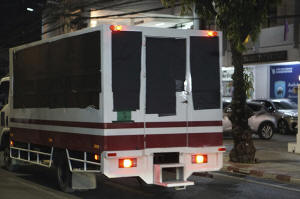Thailand deports 40 Uyghur men back to China after more than a decade in
detention
[February 28, 2025]
By DAKE KANG and HUIZHONG WU
TAIPEI, Taiwan (AP) — A group of at least 40 Uyghur men detained in
Thailand for more than a decade have been deported to China, Thai and
Chinese officials said Thursday. The men made a public appeal last month
to halt the deportation, saying they faced imprisonment and possible
death in China.
Thai lawmakers and international officials had urged the Thai government
not to deport them, warning it would amount to a serious rights abuse.
The deportation were “a clear violation of international human rights
laws and standards,” according to U.N. High Commissioner for Human
Rights Volker Türk.
“It is deeply regrettable that they have been forcibly returned,” Türk
said on Thursday. “It is now important for the Chinese authorities to
disclose their whereabouts, and to ensure that they are treated in
accordance with international human rights standards.”
U.S. Secretary of State Marco Rubio condemned “in the strongest possible
terms Thailand’s forced return of at least 40 Uyghurs to China, where
they lack due process rights and where Uyghurs have faced persecution,
forced labor, and torture.”
Rubio at his Senate confirmation hearing in January had pledged to press
Thailand — “a very strong U.S. partner, a strong historical ally” — not
to deport the Uyghurs.
In a statement posted Thursday on his agency’s website, he said the
action risks violating international human rights agreements and "runs
counter to the Thai people’s longstanding tradition of protection for
the most vulnerable and is inconsistent with Thailand’s commitment to
protect human rights.”

Thai police and security officials led by Deputy Prime Minister and
Defense Minister Phumtham Wechayachai said at a news conference in the
capital, Bangkok, that China had given assurances that the men wouldn't
face penalties or be harmed.
They said that all of them voluntarily returned after being shown a
translation of a written Chinese agreement requesting their repatriation
and declaring they would be allowed to live normally.
Tight security
Thai lawmakers, activists and lawyers had raised the alarm Wednesday
that the men were about to be deported, and after midnight. trucks with
black sheets covering their windows left Bangkok's Immigration Detention
Center, where they had been held, amid visibly tighter security on the
street outside, including briefly detaining an Associated Press
journalist and searching his belongings.
It appeared that the truck drove them to Bangkok's Don Mueang airport,
where a China Southern Airlines plane was waiting and then flew to the
heartland of China's Uyghur population in northwestern Xinjiang
province.
In a statement on Facebook, the Chinese Embassy acknowledged Thursday
that 40 Chinese nationals who it said entered Thailand illegally were
deported to Xinjiang by a chartered flight.
It said the men had been detained in Thailand for more than 10 years
because of “complicated international factors.”
Thai authorities release images
A video shown by Thai officials at a news conference on Thursday night
showed what were said to be some of the men exiting the aircraft, with
one awkwardly embraced by an unsmiling woman, while at least a
half-dozen photographers and cameramen hovered next to them.
Photos were also released of some eating a meal and undergoing health
checks as unidentified officials stood by them. No photos were publicly
available of the group's departure from Thailand.

[to top of second column]
|

This photo provided by Thailand's daily web newspaper Prachatai
shows trucks with black tape covering the windows leave a detention
center in Bangkok, Thailand Thursday, Feb. 27, 2025.(Nuttaphol
Meksobhon/Prachatai via AP)

A total of 43 Uyghur men had been held at the Bangkok detention
center. Five others stayed behind because they were serving prison
sentences for an earlier escape attempt.
It's unclear why China had only confirmed the deportation of 40.
Harsh conditions in detention
The Uyghurs are a Turkic, majority Muslim ethnicity native to
Xinjiang. After decades of conflict with Beijing over discrimination
and suppression of their cultural identity, the Chinese government
launched a brutal crackdown on the Uyghurs that some Western
governments deem a genocide. Hundreds of thousands of Uyghurs,
possibly a million or more, were swept into camps and prisons, with
former detainees reporting abuse, disease, and in some cases, death.
More than 300 Uyghurs fleeing China were detained in 2014 by Thai
authorities. In 2015, Thailand deported 109 detainees to China
against their will, prompting an international outcry. Another group
of 173 Uyghurs, mostly women and children, were sent to Turkey,
leaving 53 Uyghurs stuck in Thai immigration detention and seeking
asylum. Since then, five have died in detention, including two
children.
Advocates and relatives say the 48 remaining Uyghurs were subject to
harsh conditions in Thai detention and were forbidden contact with
relatives, lawyers and international organizations.
The Thai government’s treatment of the detainees may have
constituted a violation of international law, according to a 2024
letter sent to the Thai government by U.N. human rights experts.
Secret deportation plans
For more than a decade, the Uyghur detainees have presented a
diplomatic dilemma for Thailand, which is caught between China, its
largest trading partner, and the U.S., its traditional military
ally.
Beijing claims the Uyghurs are terrorists, but hasn't presented
evidence of that in the cases of those just repatriated. Uyghur
activists and Western officials say the men are innocent and would
face persecution, imprisonment and possible death in China.

Facing potential backlash from all sides, Thailand had detained them
indefinitely.
Discussions to deport them restarted after Thai Prime Minister
Paetongtarn Shinawatra took office last year. Her father, former
Prime Minister Thaksin Shinawatra, maintains close links to top
Chinese officials.
In December, the month after Paetongtarn and Chinese leader Xi
Jinping talked during a summit in Lima, Peru, Thai officials began
secretly discussing plans to deport the Uyghurs, according to four
people familiar with the matter. The people declined to be named for
fear of retaliation to themselves or their contacts.
After the AP reported in January that Thai authorities were
discussing deporting the Uyghurs, U.S. and other officials expressed
concern, which was repeated this week following reports about their
imminent deportation.
___
Huizhong Wu reported from Mae Sot, Thailand. Jintamas Saksornchai in
Mae Sot and Grant Peck and Jerry Harmer in Bangkok contributed to
this report.
All contents © copyright 2025 Associated Press. All rights reserved |